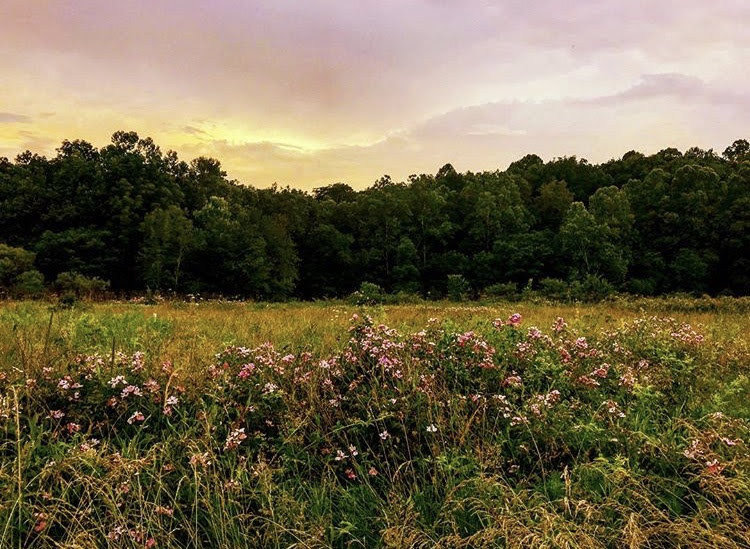Over the past several months, we have all become very familiar with sharp winds, gray skies, and rainy days here at Ohio Wesleyan. Starved of the sun and stuck indoors, we live our lives under harsh, white fluorescent lights.
These conditions have a significant impact on many people’s health. Research shows that the winter season increases stress and anxiety and decreases energy and motivation. It can also increase blood pressure and increase the heart rate. With all of these adverse impacts of colder weather, it is no wonder many Ohioans look forward to spring.
Luckily for many of us, spring has sprung! The sun has reappeared, blooming flowers have greeted us, and the winds have slowly become warmer. Now we can look forward to the many health benefits spring brings–decreased muscle tension and stress hormone levels, lower blood pressure, a stronger heart, improved sleep quality, increased attention spans, and a boosted immune system. All things to applaud when facing an onslaught of final exams, papers, and projects! It’s the perfect time to ditch the fluorescent lights for a study break and journey into nature to embrace the abundance of benefits it brings
Thanks to modern science, we know much more about how spending time in nature is beneficial. But we are not the first to recognize how beneficial spending time in nature is. The Romantic movement and many literary figures belonging to it valued time in nature and recognized the benefits as well.
Nature was a significant aspect of Romanticism. Romanticism was an artistic and intellectual movement that was popular from roughly 1785 to 1832. It had a major impact on literature. While it primarily started in France, Britain, and Germany in reaction to the Enlightenment principles, it quickly spread throughout the continent. Romantics urged society to become closer to nature and the natural order of life. Many believed nature was pure, spiritually renewing, and it often harkened back to the magical days of childhood bliss. They promoted the physical, spiritual, mental, and moral benefits of nature. Romantics also explored the duality of nature. They recognized its beauty, such as the flowers and redwood trees, along with its wild capabilities, as seen in frightening lightning storms and howling winds. In addition, Romantics also emphasized the wide range of emotions that nature holds. A specific example of a literary figure that embraced this new view of nature was William Wordsworth.
Wordsworth, an extremely famous English poet and intellectual during the Romantic period, highly valued nature. He spent much of his time, from his youth far into his adult years, as a solitary walker amongst nature. He spent his many wandering hours composing his poems by taking in all that nature had to offer and carefully observing. A poem of his titled “Lines Written in Early Spring” beautifully illustrates his thoughts towards nature and the contrast he sees between nature and humanity:
I heard a thousand blended notes,
While in a grove I sate reclined,
In that sweet mood when pleasant thoughts
Bring sad thoughts to the mind.
To her fair works did Nature link
The human soul that through me ran;
And much it grieved my heart to think
What man has made of man.
Through primrose tufts, in that green bower,
The periwinkle trailed its wreaths;
And ’tis my faith that every flower
Enjoys the air it breathes.
The birds around me hopped and played,
Their thoughts I cannot measure:—
But the least motion which they made
It seemed a thrill of pleasure.
The budding twigs spread out their fan,
To catch the breezy air;
And I must think, do all I can,
That there was pleasure there.
If this belief from heaven be sent,
If such be Nature’s holy plan,
Have I not reason to lament
What man has made of man?
This poem reveals to us the many ways Wordsworth, like other Romantics, viewed nature. Nature is not only seen as part of the whole but as the overarching principle. Many Romantics followed suit as they replaced God with Nature, claiming that everything is connected to nature–even your soul. They expressed that Nature has a natural and holy plan for us that is sacred and sanctioned by divinity. Nature is also presented as being self-sustaining, self-correcting, and overall, good. It is happy and healthy in its natural state.
Many of these central ideas that the Romantics promoted still exist in our society today, although we have some new ways of explaining nature’s benefits. We have modern science to reassure us that immersing oneself in nature can also improve brain chemistry and mental health through increased impulse control, decreased anxiety due to the lowering of stress hormone levels, and improved mood through the increase of serotonin and endorphins. Nature can help mental health so much so that ecotherapy, a formal mental health treatment utilizing nature, is increasingly popular. As we continue our study of the benefits of nature, we are only gaining more and more reasons as to why people should make the time and effort to experience the natural world.
But how can we, as busy college students, also enjoy the benefits of nature? I have ventured out to find our opportunities as students to be like the Romantics and immerse ourselves in nature! Look out for my next article to learn more!


Pingback: Nature Heals II: Channeling Your Inner Romantic – The Sturges Script